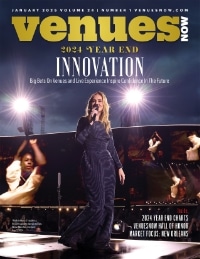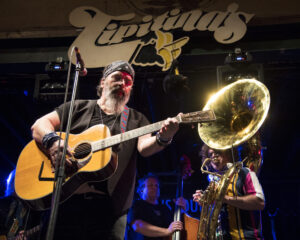WEMBLEY WAY: The storied Wembley Stadium celebrates 100 years, with a century of history under its belt and continued momentum. (English Heritage/Heritage Images/Getty Images)
London’s Wembley Stadium, one of the world’s most famous buildings, is celebrating its 100th anniversary this year. Its history is filled with entertainment milestones, from mega concerts to soccer world cups to epic boxing clashes and more.
After hosting a record 16 concerts last year, 2023 was all about putting the stadium’s versatility on display: concerts, soccer, rugby, wrestling. It’s a versatility the stadium’s team are particularly proud of.
VenuesNow reached out to Paul Smyth, head of event operations, Matt Owen, programming manager, as well as outgoing stadium director Liam Boylan to talk about some of the many elements that make Wembley Stadium iconic.
VenuesNow: How does it feel going to work every day? It’s quite an incredible office.
Liam Boylan: You never get complacent, that is for sure. You might wake up and drag yourself out of bed, but as soon as you see the arch on the drive in or get off the tube at Wembley Park and walk up Olympic Way you get that buzz. It’s the ultimate coffee hit in the morning.
It is the exact same feeling fans get when they come to a concert or a cup final. The thrill that something exciting is about to take place. We are very lucky to get that feeling every day and it is something I never take for granted.
What is responsible for Wembley’s iconic status worldwide?
Paul Smyth: It is quite ironic really as it was never intended to become a national relic. The stadium was built as the center point of the British Empire Exhibition of 1924-25 and for many years was known as the ‘Empire Stadium’. It was built in 300 days and cost £750,000.
Although it had held The FA Cup Final to vast crowds in 1923, the exhibition, for which the stadium had been originally built, was financially disappointing, sending the stadium into liquidation. Demolition was recommended.
Then along came Arthur Elvin, who saw its potential and raised the funds to keep it open. Apart from football, he relied on the growing popularity of greyhound racing to keep the finances ticking over in the early days.
Since then, of course, the stadium has gone on to host lots of other great sporting events. England’s World Cup win in 1966 saw it become one of the world’s great football stadiums, but it wasn’t until nearly 20 years later that it really became iconic across the world.
Although Wembley had hosted major music events from 1969, its finest musical moment was, arguably, the Live Aid concert in 1985. There were 70,000 fans in the stadium that day and the concert was broadcast live to more than one billion people across 110 countries.
That was when Wembley Stadium became truly, iconic all over the world. I mean, who remembers the name of the other stadium where the other Live Aid gig took place? (Philadelphia’s JFK Stadium)
How does this year rank compared to the previous record year of 14 concerts in the summer of 2019, when you also welcomed a million-plus visitors?
Paul Smyth: Well, last year we had 16 music events and that was a new record for us. This year has been slightly different in that we have had only nine music events, but a wider mix of everything else.
In the four weeks of August alone we had Football, Rugby League, music and wrestling. You couldn’t get a more diverse set of events and audiences. And I love that. I love the fact that we can turn the stadium around in such a short period of time to cater for different types of events. We should do that. It’s the national stadium and it’s only right that we put on events that appeal to a wide variety of people, not just football fans.
Can you feel the worldwide stadium boom in terms of requests from promoters?

BLINDING LIGHTS: The Weeknd’s elaborate production was erected in just a few days at Wembley Stadium, which hosted the superstar Aug. 18.
LONDON, ENGLAND – AUGUST 18: Abel ‘The Weeknd’ Tesfaye performs at Wembley Stadium on August 18, 2023 in London, England. (Photo by Samir Hussein/Getty Images for ABA)
Matt Owen: There has undoubtedly been a growing appetite for those big, multiple-night shows since the pandemic. Artists such as Harry Styles, Coldplay and Ed Sheeran have all embarked on huge worldwide tours and we have been lucky enough to have them all perform at Wembley as part of those tours.
However, the logistics in taking those big shows all around the world is just immense. They take a lot of organizing and the biggest challenge we face is fitting them in around the sporting calendar.
Unlike other sports stadia who might shut down for the summer, we keep going. We will always have our core events of FA Cup Semifinals, FA Cup Finals (Men and Women) and Playoff Finals that we need to work around.
So, that is a major challenge, and it sometimes means we just can’t accommodate all the acts we would like. However, we have made huge strides in recent years to open more windows for promoters, and our new pitch technology enables us to switch between sport and music a lot easier.
In that light, how’s the 2024 and 2025 schedule coming together? Anything you can already reveal?
Matt Owen: It’s looking busy. We have Taylor Swift for the small matter of six nights next year. The demand for her “The Eras Tour” has just been incredible. Wembley will also be holding the Champions League Final on June 1 next year so it’s going to be a busy time with some very big events.
We expect a few more big names to be announced shortly and I have already told staff that if they are looking for a weekend off next year then they will need to book it in early as the calendar is filling up.
What are some of the most recent strides you’ve made in terms of becoming an even better home for events of all kinds?
Liam Boylan: I think we are now more open and adaptable to change than ever before. The feedback in the past couple of years from promoters has been extremely positive, whereas it was more challenging when I first arrived nine years ago. You can only put on the variety of events we have this summer if you are willing to work closely with promoters to put on the show they want to put on. It can be easy to say, “No, that’s not possible.” But, actually, if you sit down with the teams and look at it logically and are prepared to work hard, then it’s amazing what can be done.
The incredible stage set for The Weeknd had to be built just days after a Rugby League Cup Final. It meant a lot of work through the night had to take place, and I will never forget looking out the window of my office and seeing that incredible transformation take place.
We then had AEW come in with their wrestling show and I thought our health and safety team might have a heart attack with the number of requests they had. Drive a car out onto the pitch? A fight in the Royal Box? Smashed glass and flames everywhere? Yeah, we can do that. And we did. And what a show it was.

READY TO RUMBLE: Wembley Stadium hosted “All Elite Wrestling: All In” Aug. 27, part of a record year for the historic facility.
Any technological investments/changes since you installed a permanent ring delay system not too long ago?
Paul Smyth: The biggest change in the last few years has been our pitch. We have moved from the traditional Desso pitch that has to be grown in situ and would take between four to six weeks to grow. We now grow the pitch away from Wembley, it is still a hybrid pitch with 3% plastic fibers, but it is a Lay & Play pitch.
This is a huge game changer, because the mature, 14-week-old pitch is harvested into rolls and brought to the stadium. It is quickly laid, and a strong pitch is ready seven to 10 days after a concert. This opens up our calendar and we not only have a much longer June and July window for concerts, but we can also open up for three weeks of August.
This will give the stadium the opportunity of increasing the concert nights to north of 20 and we are working hard with promoters to establish these new windows.
When we last spoke in 2019, sports events were already incorporating stuff from the concert/show business, like lights and visuals ahead of matches, to increase the entertainment factor. Has that trend continued? Do you have any striking examples from this year?
Paul Smyth: So now we have specialized fan zones providing pre-match entertainment outside the ground. The fan zones are used in a variety of ways depending on the audience.
So, what you might see at an England men’s fixture will not necessarily be the same as what you get at an England Women’s fixture or Rugby League final.Then, once they get inside the stadium you need to build that excitement level even further and again it needs to be tailored to that particular audience.
For example, at this year’s Women’s FA Cup Final we had presenters from Radio One perform DJ sets. For the NFL football we had the Jaguars mascot abseil from the roof of the stadium with the match ball.
You want people to go home feeling like they have had the best day out ever. We believe Wembley now provides the ultimate, unforgettable, fan experience and we will continue to develop it each year to improve that experience.
How do you deal with increased costs across every part of the entertainment supply chain, and energy in general?
Liam Boylan: Our costs have gone up in the last 12 months and while we don’t directly set ticket prices, we are aware that if our costs go up then the costs for fans, via tickets, ultimately goes up too. We can’t ignore it. We are aware that coming to a show at Wembley Stadium is not cheap. It’s a luxury item and if you are bringing a family then it becomes an expensive day out.
So, as a venue we need to ensure we do all we can to make sure the experience they get for that money, is the best it can be. People attend these big events for a bit of escapism — a chance to get away from the normality of life and do something different. I would hope everyone who has come to Wembley this year has gone away feeling like they have managed to do that.
Can you share an anecdote from any event that took place at Wembley Stadium this year that encapsulates what it feels like to put on a show at this historic building?
Liam Boylan: Seeing Damon Albarn almost break down in tears was quite poignant, I thought. I don’t think even he could believe the magnitude of performing on such a stage and I think it really got to him. He kept referring to the grand history of the stadium and how delighted Blur were to be there. He even came up with his own singalong about Wembley on the first night.
You can imagine what it might feel like performing on stage but until you look out across the sea of fans and experience it, I guess you will never know what it feels like.
He told the fans they had waited all their lives to play at Wembley and I think he genuinely meant that. He was very emotional.








